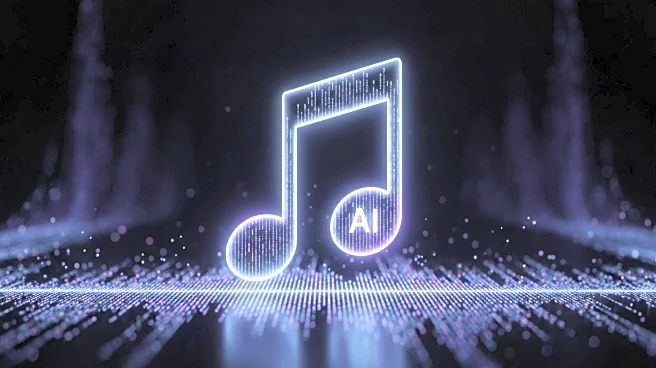What is the story about?
What's Happening?
Deezer has announced that over 28% of the music delivered daily to its platform is fully AI-generated, marking a significant increase from previous figures. This development follows Deezer's earlier reports, which indicated that AI-generated songs accounted for 10% of daily uploads in January and 18% in April. The company has implemented an AI detection tool to identify and tag these songs, ensuring they are not included in algorithmic and editorial recommendations. Deezer's proactive stance contrasts with other major streaming services like Amazon, Apple, and Spotify, which have yet to establish specific policies regarding AI-generated music. SoundCloud, however, has a policy prohibiting the monetization of exclusively AI-generated content, encouraging creators to use AI as a tool rather than a replacement for human creativity.
Why It's Important?
The rise in AI-generated music on platforms like Deezer signifies a transformative shift in the music industry, impacting how music is created, distributed, and consumed. This trend raises questions about the future role of human artists and the authenticity of music. As AI technology becomes more prevalent, streaming services face the challenge of balancing innovation with the preservation of human artistry. Deezer's approach to tagging and limiting the exposure of AI-generated music aims to support human creators, but the lack of industry-wide policies could lead to varied impacts on artists and listeners. The growing presence of AI in music creation may also influence copyright laws and the valuation of creative works.
What's Next?
Deezer's continued monitoring and reporting on AI-generated music suggest ongoing developments in detection technology and policy adjustments. As AI-generated content becomes more common, other streaming services may be compelled to establish their own guidelines and detection systems. The music industry might see increased collaboration between AI developers and artists, potentially leading to new genres and creative processes. Stakeholders, including artists, record labels, and legal experts, will likely engage in discussions about the implications of AI in music, focusing on ethical considerations and the protection of intellectual property rights.
Beyond the Headlines
The integration of AI in music creation poses ethical questions about the nature of creativity and the value of human input. As AI tools become more sophisticated, they challenge traditional notions of authorship and originality. This shift could lead to a reevaluation of what constitutes art and creativity, influencing cultural perceptions and industry standards. Additionally, the widespread use of AI in music may prompt discussions about the potential for AI to democratize music production, making it accessible to a broader range of creators.















